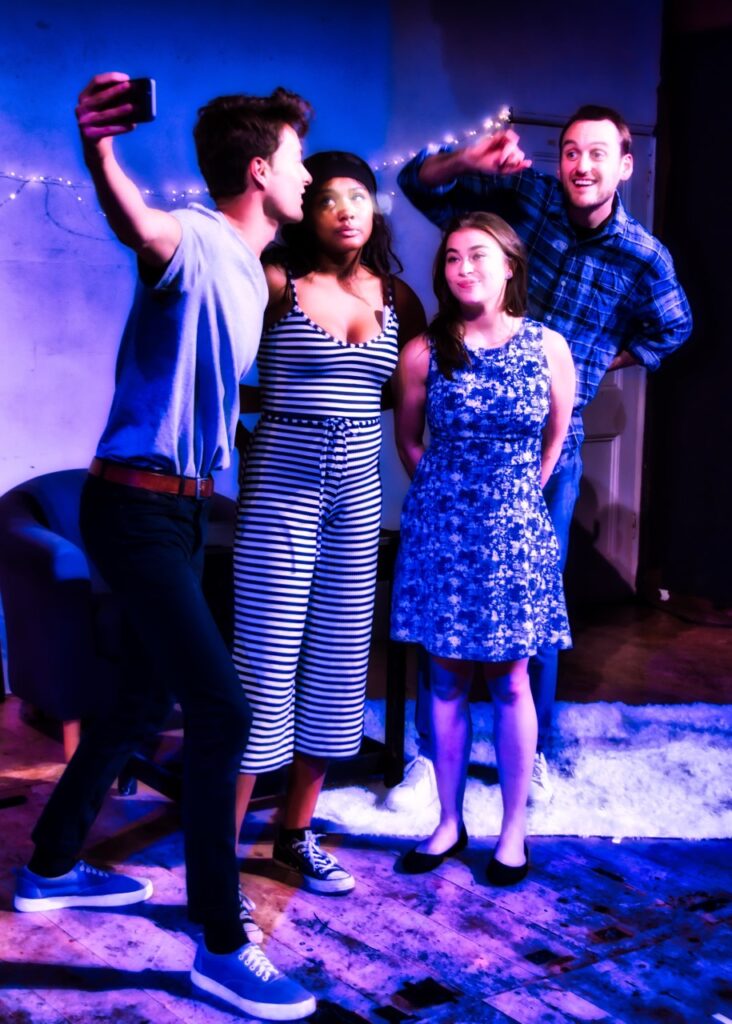The Space – until 11 June 2022
Reviewed by Claire Roderick
4****
Written in response to revelations about social media influencers, and playing in the aftermath of the Heard/Depp trial by TikTok, Lauren Morley’s The Collab is a refreshingly unsensational play about consent and coercion.
Student Ella (Louise Lord) has an eco-lifestyle channel with just over 100.000 followers. Her best friend Kat (Maria Eastwood Krah) is a fashion photographer who helps behind the scenes mostly, unable to keep a straight face on camera. Both girls respond to Max’s call for women to take part in his project about the male gaze in art, reimagining female figures from famous paintings. Max is another influencer with over 2 million followers: a self-proclaimed feminist with a mission to make art more accessible with his Art Is Everywhere assignments. Thrilled to meet him and to receive options for the project, Ella realises that she has been sent very wholesome paintings while Kat has more risqué choices. Wanting to impress Max (Andre Frey) and perhaps challenge herself, Ella takes one of Kat’s options, The Luncheon on the Grass, where the female figure is nude.
Her views about why the painting was thought scandalous are vastly different to Max’s, who just focusses on the nudity, and their argument and Ella’s choices in the shoot pique Max’s interest. The pair begin a relationship, although Max refuses to use labels and does not want to acknowledge that they are a couple in public. The fact that this is Ella’s first relationship means that she doesn’t know what behaviours are acceptable and she makes excuses for Max’s behaviour. This is in stark contrast to Kat’s suspicions, and Ella thinks she is being overprotective of her and seeing red flags where there aren’t any because of her experiences growing up with an abusive father. The reactions to Max by the two women with hugely different life experiences is portrayed delicately and realistically, with Kat walking on eggshells trying not to alienate her friend but growing ever more frustrated as she watches Ella become increasingly isolated under Max’s influence in real life as the number of her online followers leaps. Max’s friend Brett (Clark Alexander) is thrown into the mix as a Neanderthal red herring to highlight Max’s seemingly empathetic and gentle nature, but Clark Alexander’s delightfully comic awkwardness in later scenes reveal that he is the kind and caring (and slightly annoying) friend the women need.
Louise Lord impresses as Ella – sweet and naïve, but with a steely strength underneath that is evident from the final scenes. Lord always gives Ella agency; the fire is always there but damped down whenever Max manipulates her into “choosing” to do what he wants. When Ella finally realises what Max is and what he has done to her life, Lord’s physical reaction is perfectly judged. There are no big reactions, just cold dread on her face. Maria Eastwood Krah’s Kat is also remarkable – scarred but still open to those she trusts and full of deadpan humour. The scenes between the two friends are wonderful to watch, with a lovely chemistry that makes you mourn the splintering of their relationship. Andre Frey convincingly captures Max’s narcissism – your skin will crawl as he lurches between the public smoothness to petulant pouts and fleeting glimpses of predatory sleazebag – and his hold over Ella is completely believable. The incidents are small and subtle at first, but as Ella’s popularity eclipses his own Max’s gaslighting occurs more publicly. The plot seems to move very slowly at first, making me think initially that there could be edits made, but as the first act progressed I understood that the slow burn is necessary, sucking the audience into Ella’s jolly and optimistic online persona as she was gradually worn down by Max and showing the routine comfort and need Ella felt, making the conclusion more shocking and dramatic. Astute direction by Rachael Bellis allowing Morley’s story to breathe.
The toxicity of online comments and attacks, which have become so prevalent that they are now a twisted form of entertainment for some, are shown to have real life effects on Ella, but her ultimate strength and determination to follow her dream ends the show on a positive note. Kat’s views on Picasso’s painting of his young lover are sharp, funny and on point, highlighting the freedoms and lack of consequences historically available to powerful and famous men, demonstrated in this century by the devoted support of celebrities on social media. Lauren Morley tackles that this relationship was instigated by Ella (a fact that would be weaponised online in real life) with Ella owning the fact that she pursued Max in a beautifully written and acted filmed statement to her followers. The heartfelt and clear explanation of what manipulation and coercion happened and how it felt leaves no grey areas – this was abuse. The switches from the actors on stage talking into their camera to recorded clips of the same monologues above the stage is slick and highly effective creating the sense of voyeurism and separation felt watching online rather than seeing that person as flesh and blood with real feelings.
The Collab is an uncomfortable watch at times, but light-hearted and warm-hearted moments ease the tension. There are many recognisable scenes in this remarkable play that may well make you determined to be more attentive and present for friends and family and think twice before commenting online.

